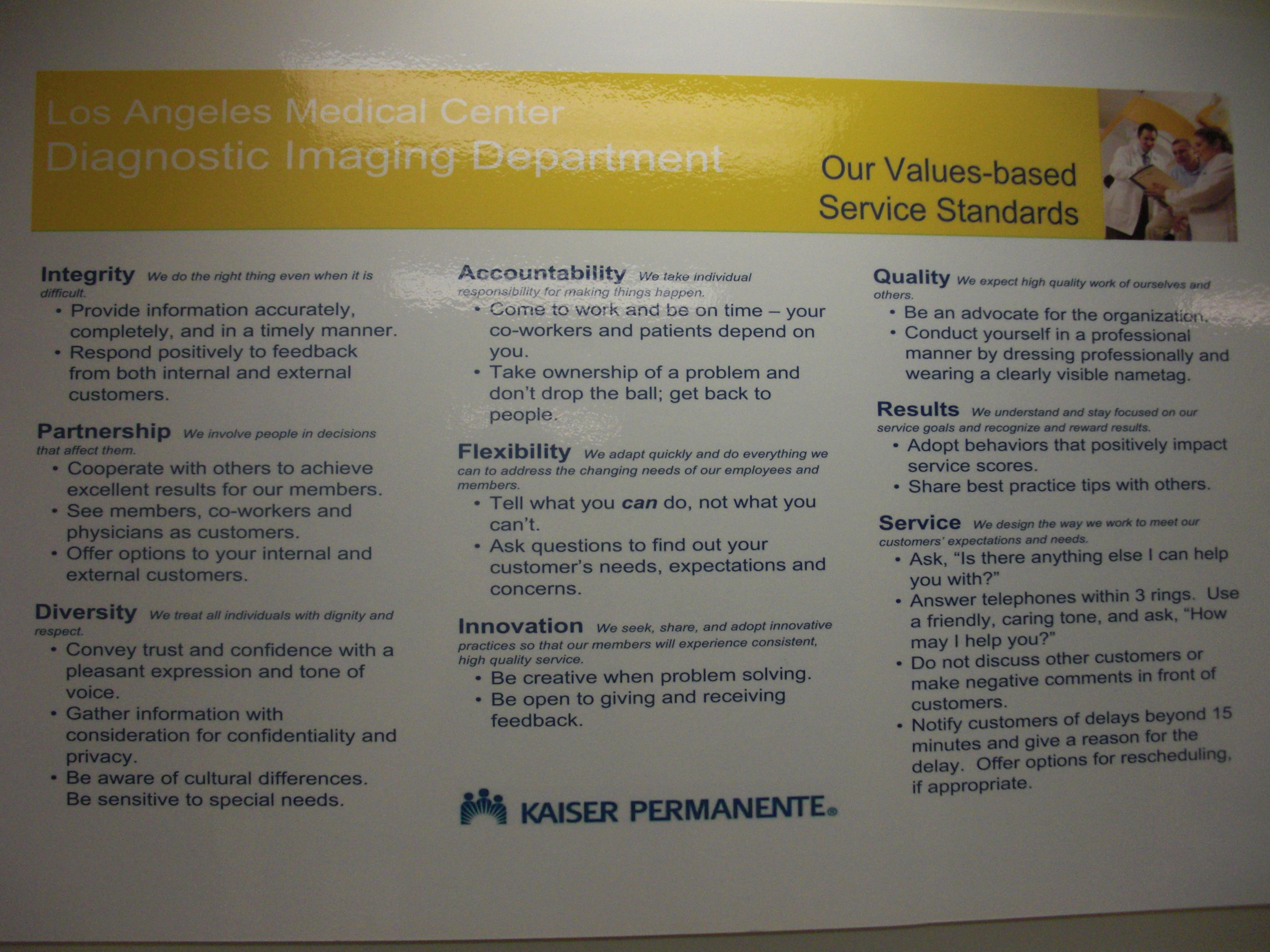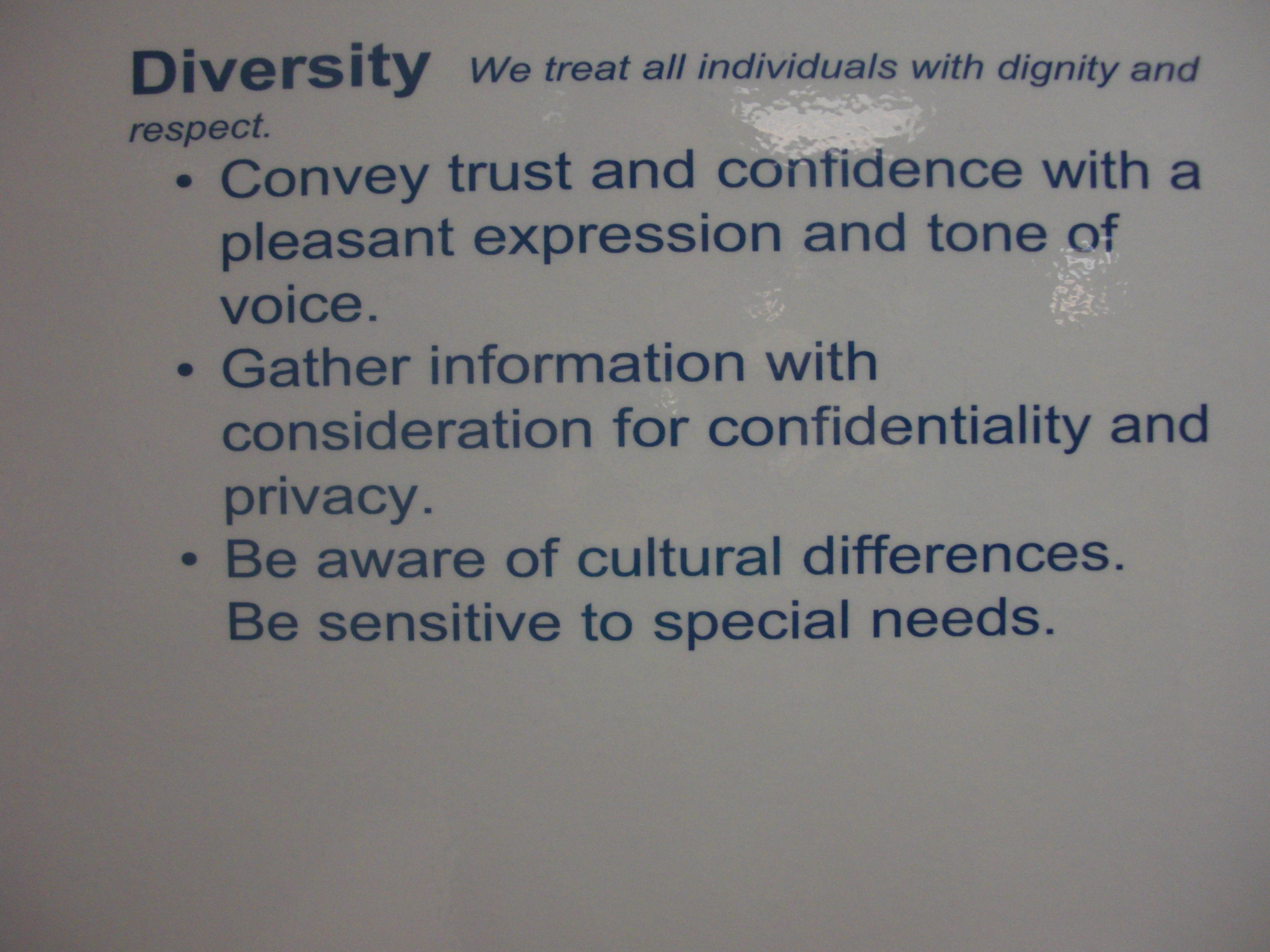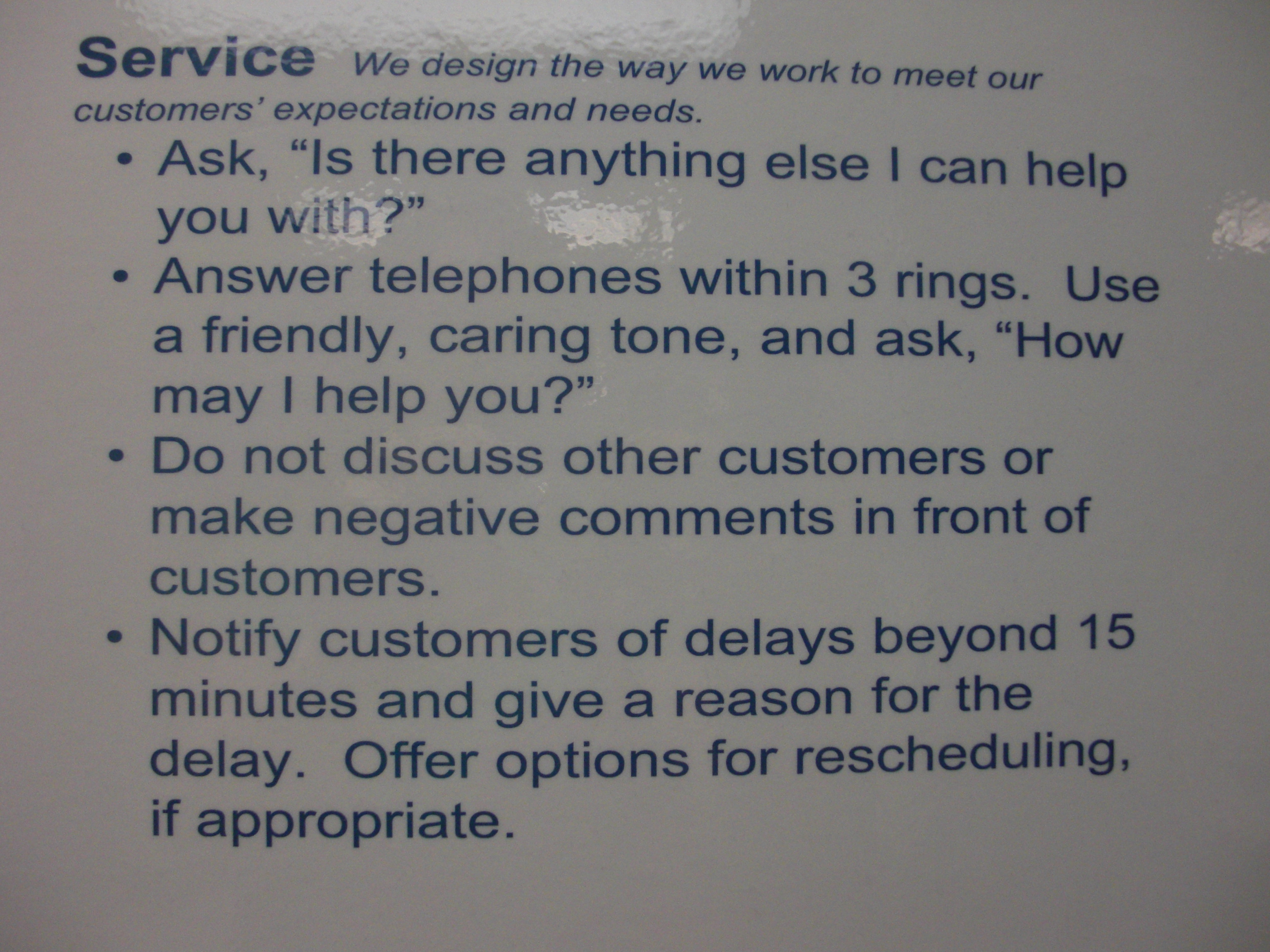This sign was posted in sight of the customer at the Days Inn (where I stayed when I failed to get out of Logan airport after the American Sociological Association meetings in August of 2008). I have incuded three observations after the image and text.
Text:
At Days Inns…
We Promise…
“Service with a smile, a cheerful greeting, a pleasant Hello.”We Mean It When We Say…
“It’s no trouble at all.”We Want To Know…
“If you enjoyed your stay.”Because At Days Inn…
“We look forward to seeing you again.”That’s our promise to you from every member of the Days Inn family.
(1) It is a nice example of the kind of emotional work that employees are required to do. It’s not just about getting customers into rooms efficiently and politely, it’s about a putting on a shit-eating grin and kissing their asses. Or else you’re fired.
(2) It’s also an example of a for-profit company calling itself a “family.” You are supposed to do things selflessly for your family, but you work at a job for money. Comparing a company to a family, I suspect, is one way to get employees to give to the company out of kinship-like duty instead of on contractual terms for money. This, of course, and ironically, lines the pockets of executives quite nicely.
(3) The logic behind their use of quotation marks eludes me.
NEW: I took these picture in a Kaiser Permanente hospital in Hollywood in October 2008. Close-ups and remarks below.
Like in the Days Inn example, employees at Kaiser are to do more than simply do their job effectively, they must do it “pleasant[ly]” and with “care.” It is one thing to be instructed to “gather information with consideration for confidentiality,” and quite another to be asked to “convey trust and confidence.” Scholars of emotion work note that the emotional part of jobs is (1) rarely seen as a skill or (2) a toll that makes your job trying and is, therefore, (3) undercompensated. Yet, the ability to “convey trust and confidence” in strangers is certainly a special one and the health insurance employee that can do that is certainly valuable. Unfortunately, like with other type of care work (i.e., nursing, teaching), that “value” is mostly lipservice and rarely translates into anything with exchange value (i.e., CASH).
For another example of emotion work, this one a sneak look behind the counter, click here.





Comments 14
Sociological Images » THERE’S NO MIDDLE CLASS AT UNITED AIRLINES — August 11, 2008
[...] WHO SHOULD REPRESENT AMERICA? EMOTION WORK AT THE DAYS INN [...]
Elena — August 11, 2008
And then, Americans on holiday in Europe confronted with waiters who don't have to smile as a job requirement think they're surly :P
OP Minded — August 11, 2008
If folks want to be surly, then they shouldn't be in the "hospitality" industry. The profession of "inn keeper" has a long, long history and there are certain reasonable standards that expected, one of which is making guest feel welcome. If folks don't want to do that kind of work, they should seek employment elsewhere.
Will — August 11, 2008
I don't see the job as making guests feel "welcome". In my opinion, it's a matter of serving customers (in fact the use of the term "guests" to imply a personal relationship is somewhat ridiculous in itself). The job is making sure things are clean, food is fresh and tasty, things are handled in a timely manner, etc. While there is a minimum level of politeness required, I don't think it's reasonable to expect service employees to act like they're having a jolly good time taking your luggage upstairs.
Of course... that may be part of the reason why I don't work in the hospitality industry...
Elena — August 11, 2008
Chalk it up to cultural differences. Here in Europe we do not hold the illusion that you coming through the door is the employee's greatest moment of the day. Quick, efficient service? Great. Big fixed smile and forced cheer? Creepy.
K — August 11, 2008
As another European, I will second that we find it creepy when staff are forced to be fake-friendly as part of their job.
I have worked in hospitality, and I would consider it important to be cheerful and pleasant to customers, but not overly familiar. Pretending we have a personal relationship when we don't just seems weird.
Nonetheless, the fake-chummy approach is getting more common here, even in really odd situations. When my grandfather was dying, the nurses in hospital always called him "James" and not "Mr Smith". Nothing wrong with that as such - I wouldn't want everyone to call me by my surname and title if I were in hospital, but I'm not 87. And besides, he was always called Jim by people who did have a personal relationship with him. Reading a name off a chart doesn't mean you know what a person would like to be called.
Bryce — August 11, 2008
@ OP Minded.
A comment on your "inn keeper" analogy. I would suggest that in the long history you mention, inn keepers were generally individuals who owned the inns in which they were working. Thus, an inn keeper would directly benefit (financially) from their emotional work because they would retain the profits earned by their inn. This, of course, is a stark contrast to the situation of employees at a Days Inn.
po — August 11, 2008
Again, it is called the "hospitality" industry.
A "pleasant hello".
"Hoping you enjoyed your stay"
"Looking forward to see you again"
are all very basic ways to be NICE to guests. What is wrong with you folks? As for the Europeans, the above statements have nothing to do with being overly familiar. Just common courtesy...
Again, if you aren't a friendly person, don't be in the hospitality business. Go get another job...
Interrobang — August 11, 2008
PO, you're obviously not getting that what is considered "nice" in your culture is considered creepy and over-the-top in another culture. I'm Canadian and I find the American-style service, where the person is all over you and won't stop with the huge plastic smile, to be very off-putting. I don't want a service worker at a hotel to insinuate that they'll be seeing me again; they won't. To me, that's as pushy as "upselling." ("Upselling" is, for example, "Would you like fries with that?" Note to business types who encourage this: If I'd wanted #%@*(ing fries, I would have *#%@!ing asked for them, no?) I don't like "pushy" in the service business. If I want something, if I need something, I'll ask for it.
Matt K — August 11, 2008
Hospitality industry, sure, but do you really need signage like this? Having done some research into Hochschild's work I'd be interested in knowing if it's been applied to this kind of industry. Any info on this, Lisa?
Ranah — August 13, 2008
You should go to Russia. The air-hostesses are stern and do not greet unless being greeted. :)
Sociological Images « Saucers of Mud — August 18, 2008
[...] blog, which uses pictures to explain stuff. See the sexualization of female Olympic athletes, this post on how employees have to put their emotions to work, this post on the incompatibility of sex and [...]
Jay — November 1, 2008
In American healthcare it can translate into cash, at least in some settings. The multispecialty group I work for provides bonuses for physicians and staff when our patient satisfaction scores reach a certain level. Emotion work plays a large role in raising those scores.
For clinical providers, at least, doing emotion work well doesn't take a toll. It increases our own satisfaction and our effectiveness, and it saves us time. I know that's not true for service workers, at least not in the same way, but it may be true for other medical professionals.
Lisa Wade, PhD — November 1, 2008
Jay,
That's great information. Sociologists who study emotion work largely critique it because it is not valued, that is uncompensated. Consider how many of the jobs high in emotion work are on the lower end of the pay scale (teaching, nursing, receptionist) and being able to be nice to lots of people all day long (who may or may not be nice) is not seen as a skill or as work. So the fact that people get bonuses for their emotion work goes a long way towards addressing the critique that sociologists are making.